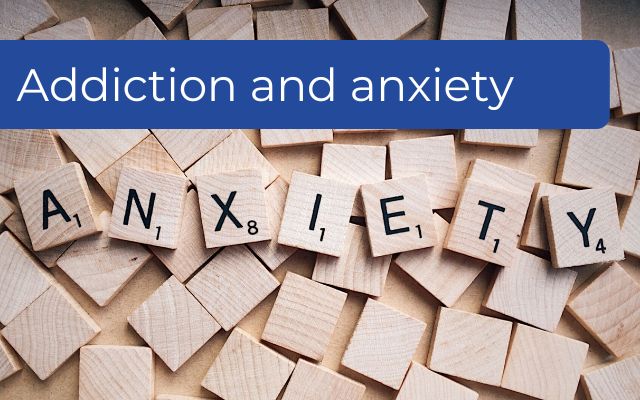
Addiction and anxiety frequently coexist and complicate recovery
If addiction and anxiety often co-occur, how can integrated treatment help someone navigate recovery and reduce relapse risk?
There is a link between addiction and anxiety which means they often occur at the same time. Addiction treatment addresses both the substance problem and any co-occurring mental health issues simultaneously. When addiction occurs alongside other mental illnesses, which occurs often, it is termed dual diagnosis.
The link between mental illness and addiction goes both ways. About 50% of people with a severe mental illness are also affected by a substance problem. Moreover, roughly 37% of alcohol abusers and 53% of drug abusers have at least one other serious mental illness.
Although statistics for South Africa are not available, in the United States it is estimated that 69% of all the nation’s alcohol and 84% of all the cocaine used in that country is consumed by people who have been diagnosed with another mental illness in their lifetime.

Dual diagnosis: What’s the link between addiction and anxiety?
What is anxiety?
Everyone feels anxious from time to time but when it becomes persistent and debilitating normal worry can turn into an anxiety disorder i.e., a recognised mental illness.
People with anxiety disorders have “intense, excessive and persistent worry and fear about everyday situations”.
People diagnosed with an anxiety disorder are also known to have panic attacks which are repeated episodes of heightened panic or “sudden feelings of intense anxiety and fear or terror”.
The feelings of anxiety or panic are out of proportion to the given situation or danger, are hard to control and can interfere with one’s ability to carry out one’s daily activities or responsibilities.
Examples of common anxiety disorders include:
- Generalised anxiety disorder
- Social anxiety disorder or social phobia
- Other phobias
- Separation anxiety disorder
Symptoms of anxiety include:
- Feeling nervous, restless or tense
- Experiencing a sense of danger, panic or impending doom
- Increased heart rate
- Trouble concentrating on anything other than the immediate worry
- Difficulty sleeping
- Struggling to control worry
- Avoiding things, people or situations that trigger anxiety
- Fidgeting
Symptoms of a panic attack include:
- Racing heart
- Hyperventilation
- Chest pain
- Sweating
- Shortness of breath
- Trembling
- Hot flushes or chills
- A choking sensation
- Dizziness or feeling weak or faint
- Numbness or pins and needles
- Ringing in your ears
- A feeling that you may be dying
What is the link between anxiety and addiction?
In a 2006 study it was found that 30% of people with a drug or alcohol addiction also had an anxiety disorder at some point in their lifetime. The link goes both ways: Among those who had an anxiety disorder, almost 20% had experienced a drug or alcohol problem in their lifetime.
People with anxiety are at an increased risk of developing an addiction and people with an addiction are also more likely to develop a problem with anxiety.
The link often has to do with the fact that people with anxiety often use drugs or alcohol to self-medicate or manage their symptoms even though, in the long-run, substance abuse can make anxiety symptoms worse. Alcohol and other drugs offer powerful short-term relief from worry, panic and fear helping people to feel calm or numb.
It is completely understandable that a person who fears social situations turns to alcohol to cope in such environments. However, by relying on alcohol or drugs to reduce anxiety, a person is simply running from their problem instead of learning to cope in healthy ways.
Additionally, substance abuse can cause changes in the brain reducing a person’s ability to cope with stress and manage anxiety thereby triggering panic or an anxiety disorder.
Treating addiction and anxiety
It is very important to treat both the anxiety and the addiction at the same time during rehabilitative treatment. Untreated or under-treated anxiety in an addict or alcoholic increases the risk for relapse and poor outcomes of substance abuse treatment.
But differentiating between symptoms of an independent anxiety disorder and addiction is very difficult. Intoxication as well as withdrawal often cause heightened anxiety and a long-term anxiety disorder could be missed by professionals who believe the anxiety will disappear after detox and prolonged abstinence from drugs and alcohol.
Amongst addicted clients, symptoms of anxiety often do resolve after the detox period but not for people suffering from an anxiety disorder.
This is why it is important to have professionals like psychiatrists who are experienced with treating dual diagnosis treating clients in rehab centres.
Anxiety poses other unique challenges in addiction treatment for example, being too anxious to attend or open up in group therapy. Additionally, clients might refuse to attend treatment due to fears of catastrophe and need to be managed in a sensitive manner to both begin and complete rehabilitative treatment.
Experienced psychologists are also needed to assist clients to develop coping skills to manage their anxiety both during treatment and after they have been discharged to successfully maintain their sobriety.
Drugs commonly used to treat anxiety, called benzodiazepines, are addictive and should not be prescribed to people with addiction which is another reason for the need for experienced professionals to be a part of the clinical team.
It is important to note that, although treating anxiety alongside addiction is difficult, it is completely possible with the right approach and many people with anxiety disorders have found long-term sobriety.
Are you looking for a treatment centre experienced in treating clients with dual diagnosis? Contact us today.






